Queer History at Brandeis
Accessible Version
1957
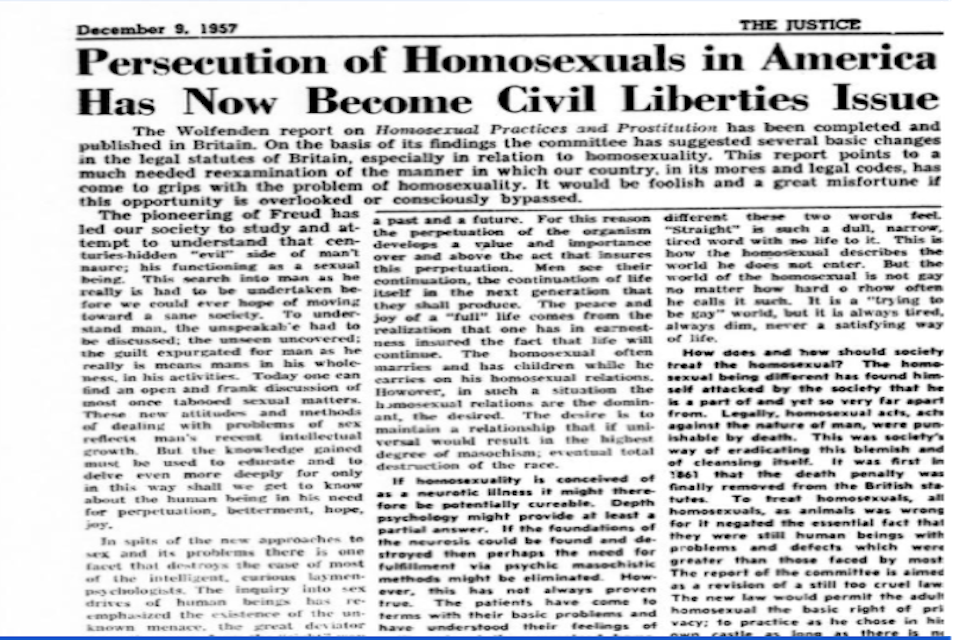
Photo Credit: Courtesy of the Robert D. Farber University Archives & Special Collections Department, Brandeis University
December 9, 1957
"The Persecution of Homosexuals in America Has Now Become a Civil Liberties Issue," written by Steve Berger, is published in response to a British report investigating "Homosexual Offences and Prostitution"
1970
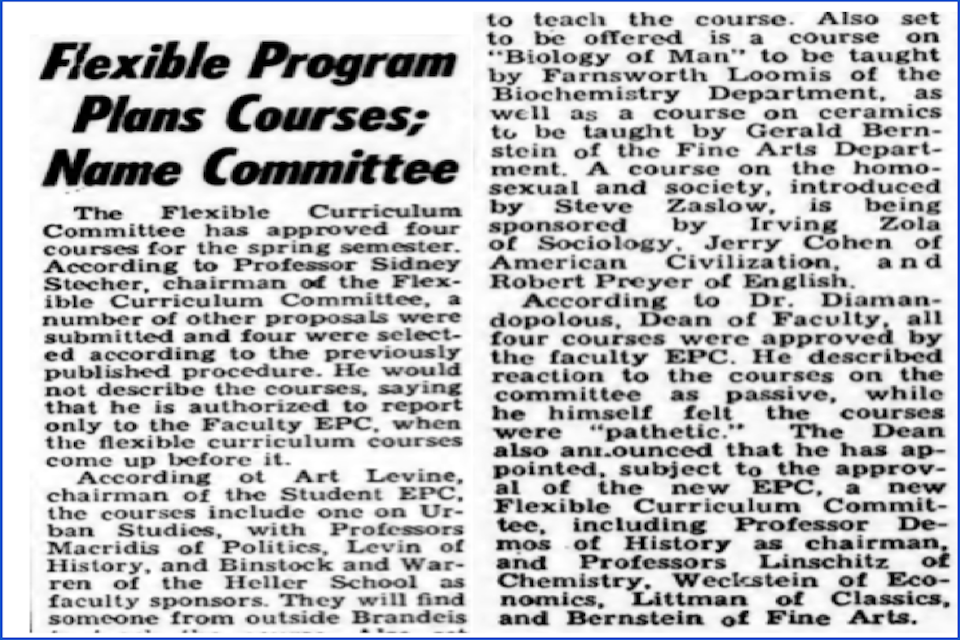
Photo Credit: Courtesy of the Robert D. Farber University Archives & Special Collections Department, Brandeis University
January-May 1970
The class is advertised in the Justice in November of 1969, but cannot be found in the course catalog printed at the beginning of the 1969 fall semester.
1975
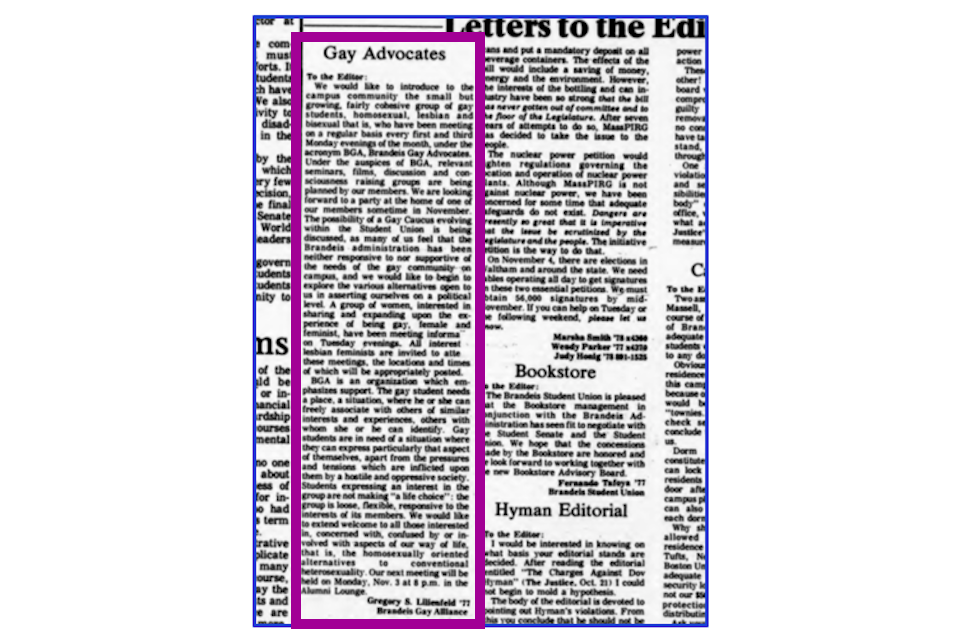
Photo Credit: Courtesy of the Robert D. Farber University Archives & Special Collections Department, Brandeis University
October 28, 1975
Gregory S. Lillenfield '77 sends a Letter to the Editor announcing the existence of the Brandeis Gay Advocates on campus. The group met twice a month and hoped to introduce a Gay Caucus into the Student Senate to advocate for them.
1976
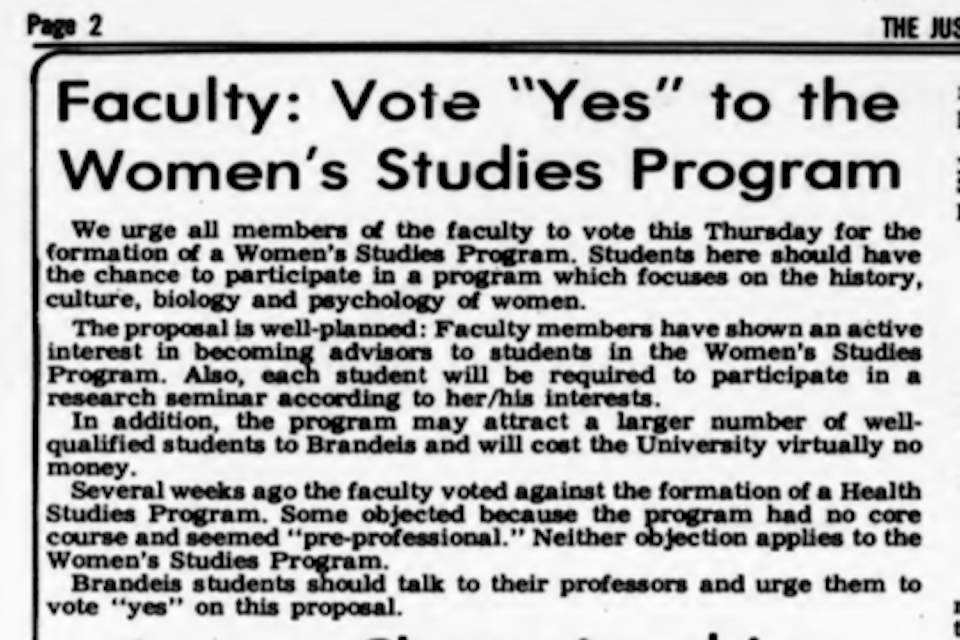
Photo Credit: Courtesy of the Robert D. Farber University Archives & Special Collections Department, Brandeis University
November 19, 1976
The proposal to establish the Women's Studies program passed at a faculty meeting. Students waiting outside the meeting for results of the vote broke out cheering.
1977
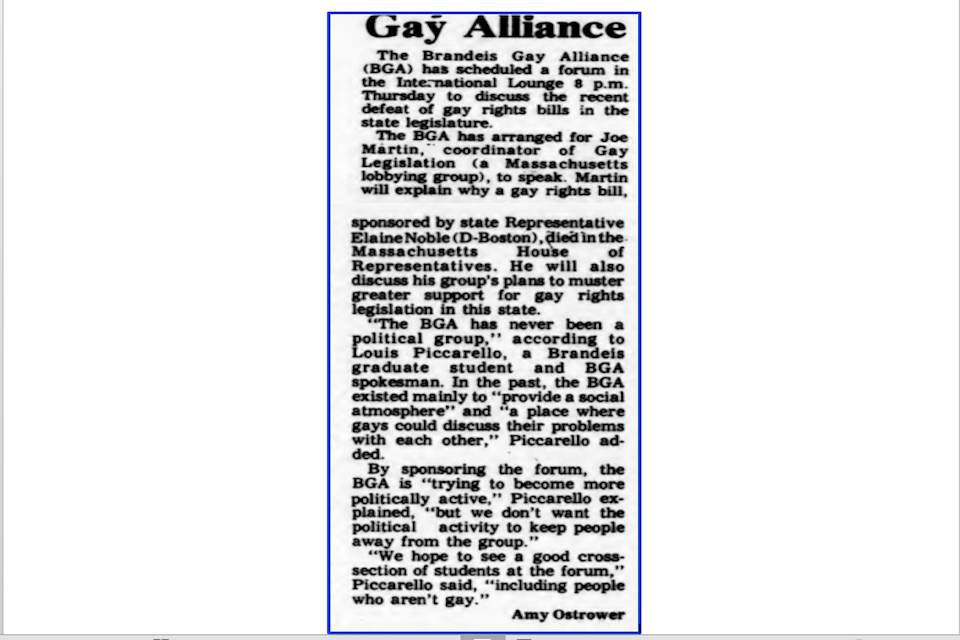
Photo Credit: Courtesy of the Robert D. Farber University Archives & Special Collections Department, Brandeis University
November 3, 1977
After the defeat of several gay rights bills in the Massachusetts legislature, the BGA started to take steps to become more politically involved, including hosting a speaker from Gay Legislation for MA
1978
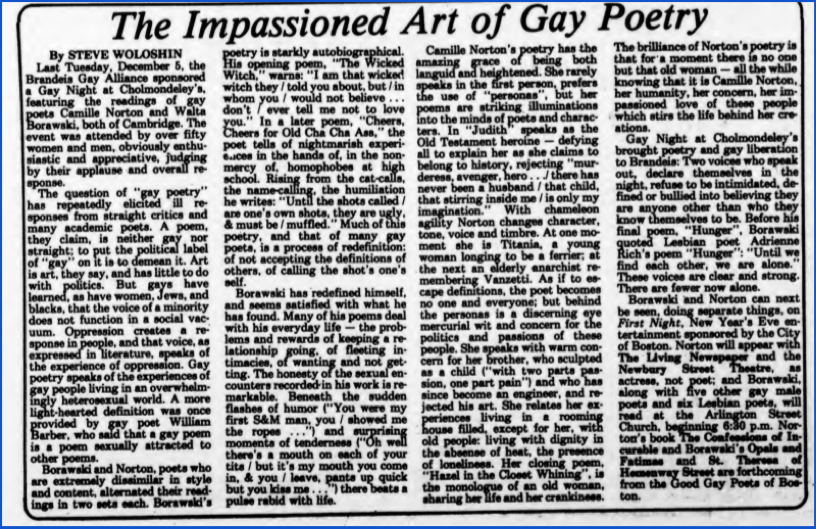
Photo Credit: Courtesy of the Robert D. Farber University Archives & Special Collections Department, Brandeis University
December 5, 1978
BGA sponsored the event to bring "poetry and gay liberation" to Brandeis, hosting readings of gay poets Camille Norton and Walta Borawski. This was part of BGA's wider reach for campus acceptance, which also included bringing the Gay Community News, a weekly American paper, through the bookstore
1981
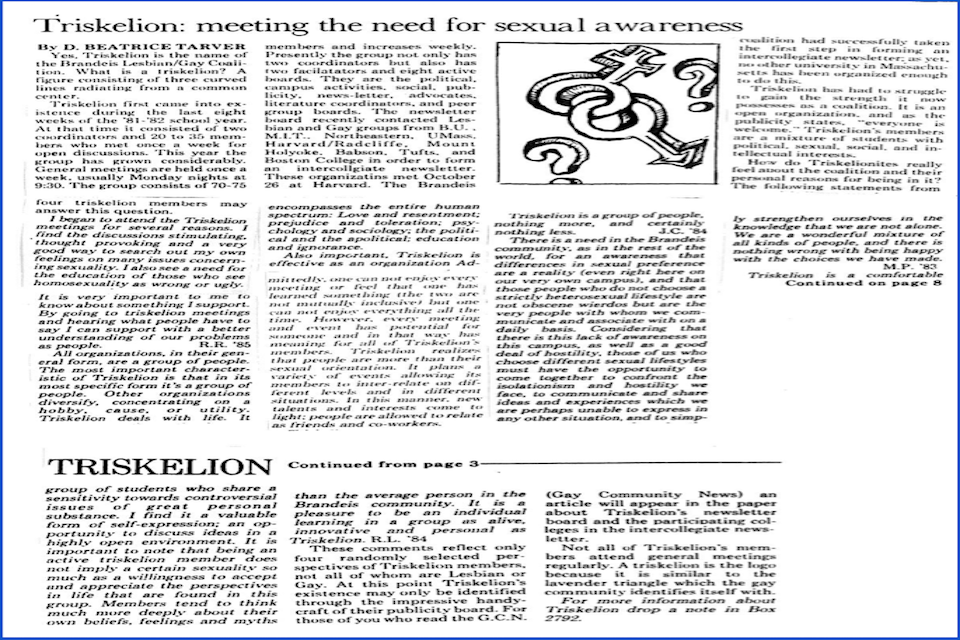
Photo Credit: Courtesy of the Robert D. Farber University Archives & Special Collections Department, Brandeis University
1981-1982
Originally taking its name from a Star Trek episode so members who didn't want to be outed could claim it was a fanclub, Triskelion announced itself openly as a gay campus organization in November 1982 and remains an active presence on campus today.
1982
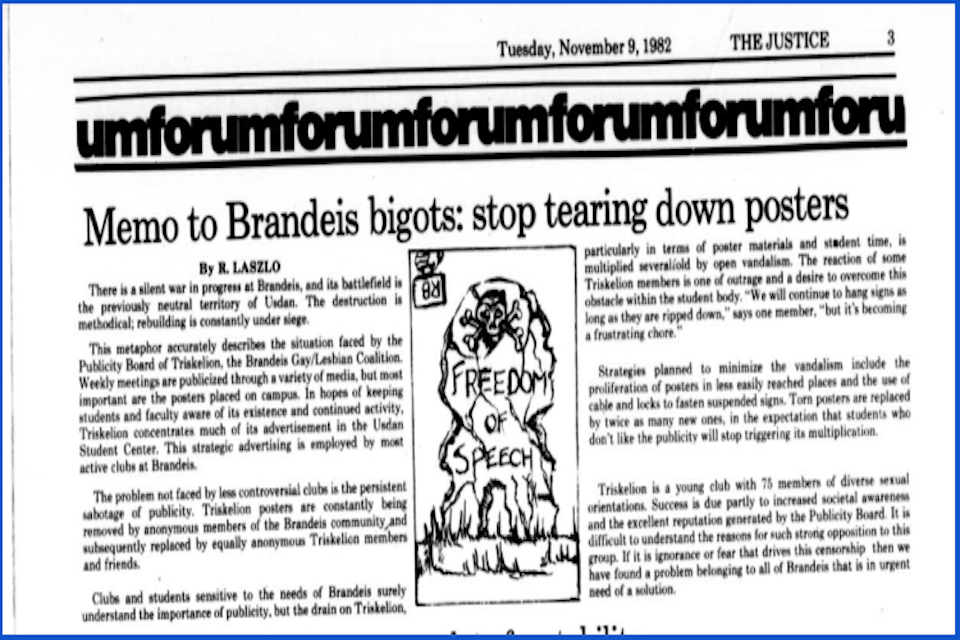
Photo Credit: Courtesy of the Robert D. Farber University Archives & Special Collections Department, Brandeis University
November 1982
On November 9, the Justice published a 'Memo to Brandeis bigots,' calling for an end to the repeated ripping down of Triskelion posters in Usdan. Vandalism would be a recurring issue for Trisk over the years.
1985
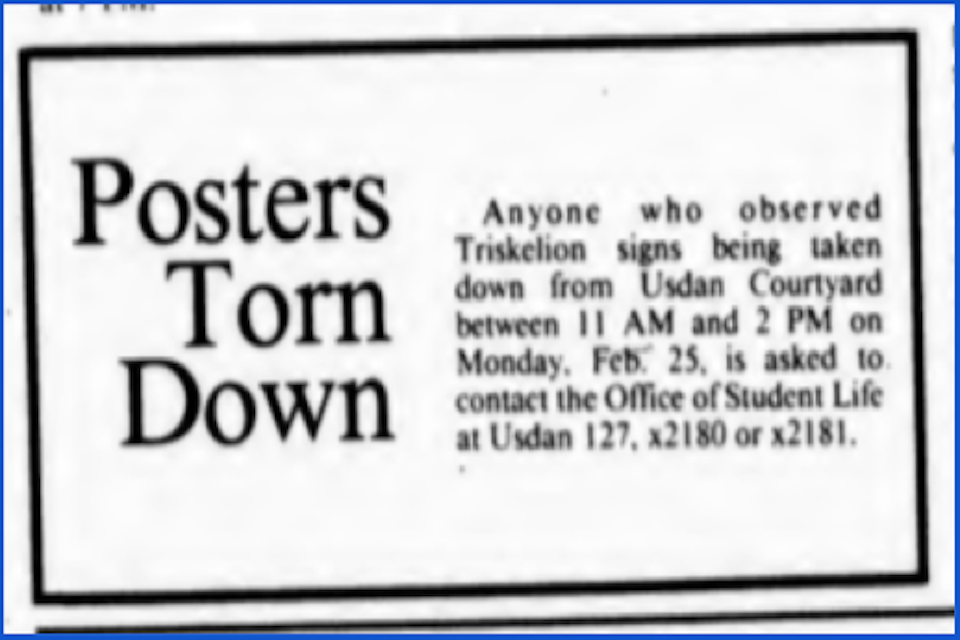
Photo Credit: Courtesy of the Robert D. Farber University Archives & Special Collections Department, Brandeis University
February 1985
The Justice published an announcement of the incident and asked any student witnesses to come forward. Published incidents of vandalism: 2.
1986
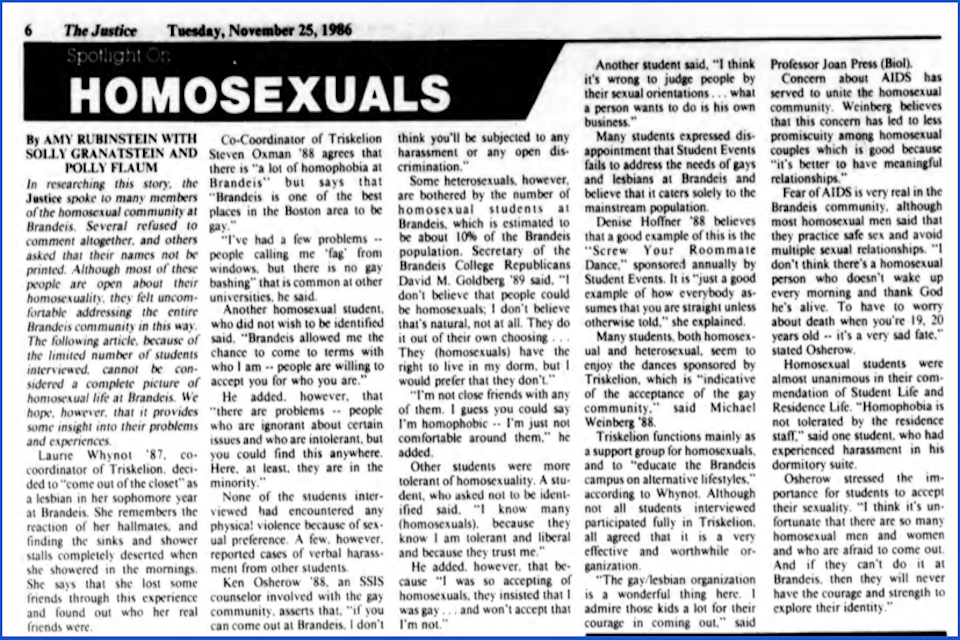
Photo Credit: Courtesy of the Robert D. Farber University Archives & Special Collections Department, Brandeis University
November 26, 1986
This issue of the Justice featured three articles involving homosexuality--interviews with students, a guest writer confessional, and a panel on Judaism and homosexuality.
1987
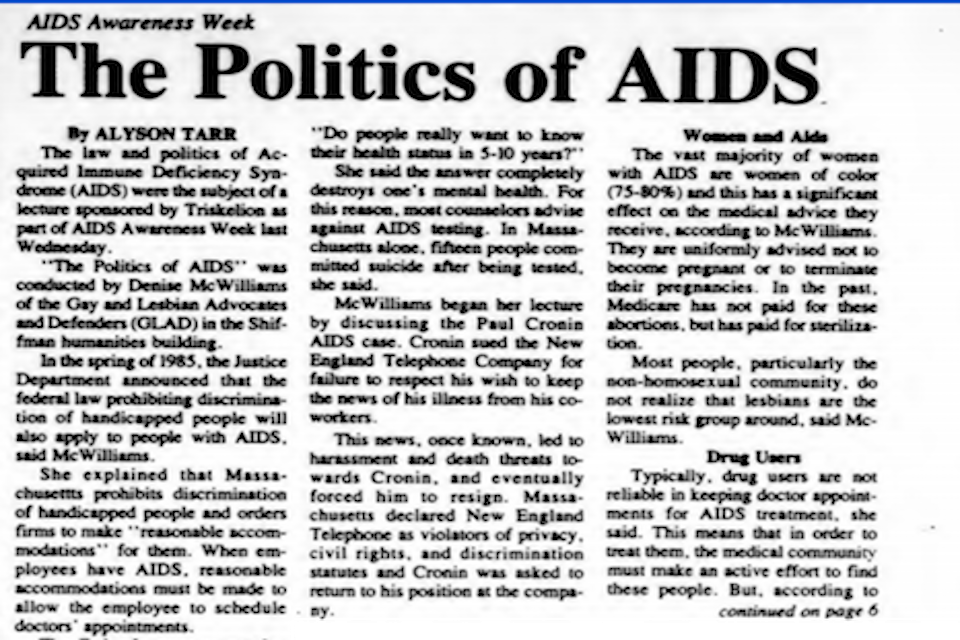
Photo Credit: Courtesy of the Robert D. Farber University Archives & Special Collections Department, Brandeis University
October 7, 1987
Trisk sponsors talk by Denise WIlliams of GLAAD, presents 'First Annual Bacchanalian Forbidden Fruit Festival' (first mention of what would go on to become a tradition of gay dances), sends 35 students to Gay Rights March in Washington, D.C. on October 11
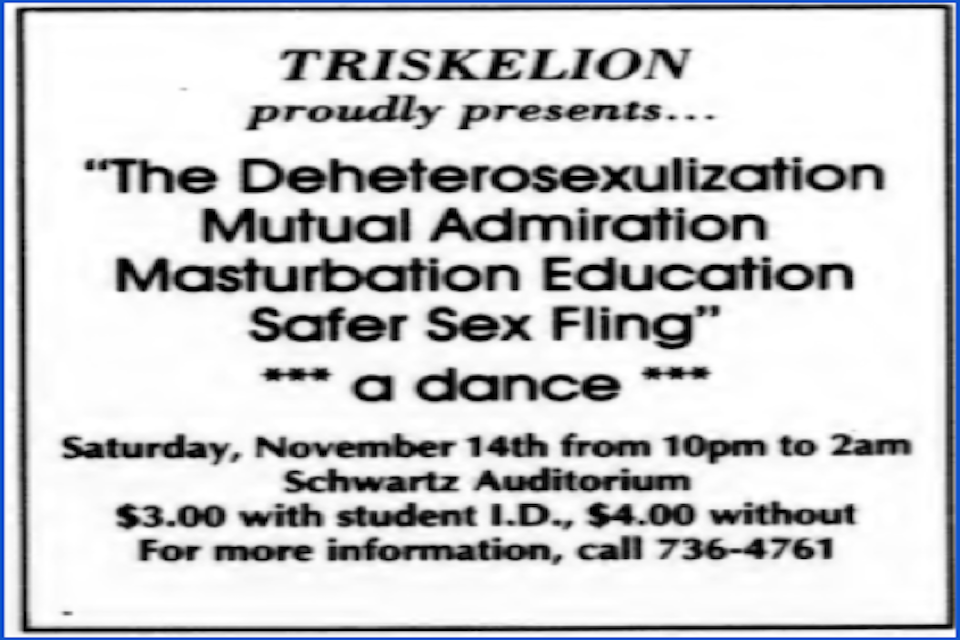
Photo Credit: Courtesy of the Robert D. Farber University Archives & Special Collections Department, Brandeis University
November 14, 1987
A dance party co-sponsored by Trisk and the SSIS. Campus dances, which often extended invitations to other schools, were consistently the best places for gay people to build new friendships and relationships.
1991
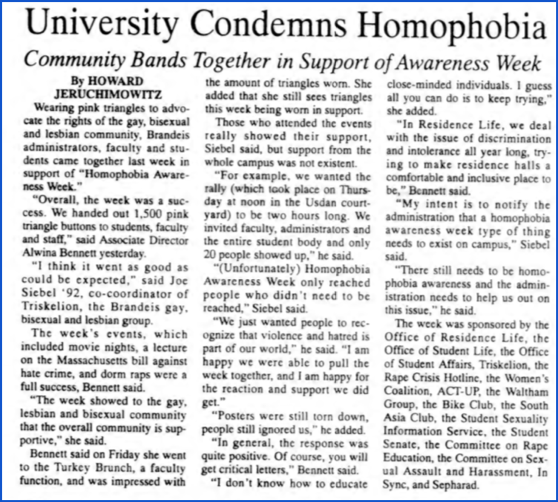
Photo Credit: Courtesy of the Robert D. Farber University Archives & Special Collections Department, Brandeis University
October-November 1981
After a public event featuring a female student who kissed another woman led to harassment of the kisser, students and members of the administration began to call for greater campus awareness and an end to 'gaybashing'. Trisk hosted the awareness week, which featured speakers and concluded with a rally.
1992
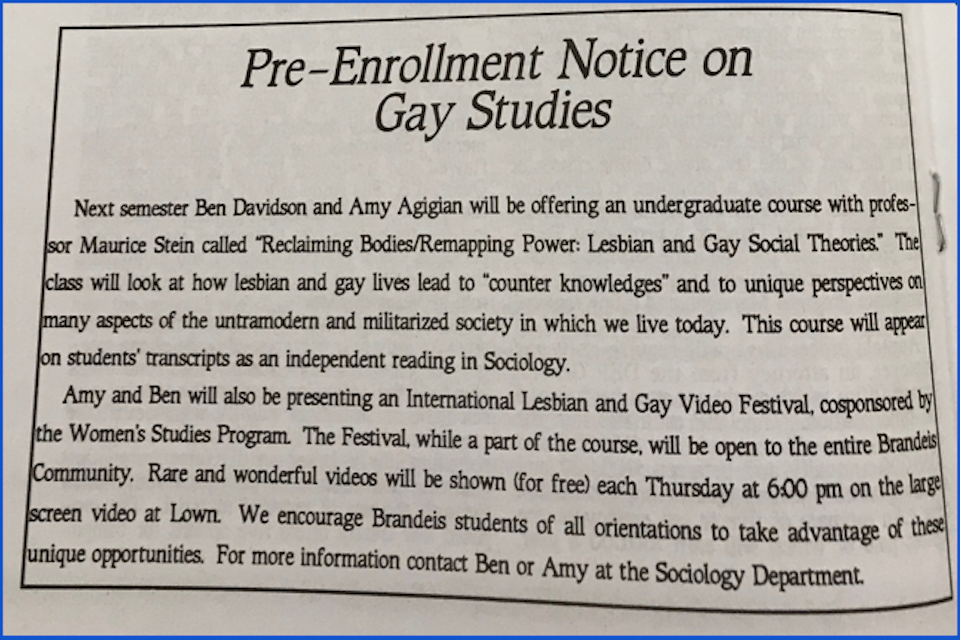
Photo Credit: Courtesy of the Robert D. Farber University Archives & Special Collections Department, Brandeis University
January-May 1992
Sociology grad students (Ben Davidson and Amy Agigan) sponsor and teach a course on gay studies--"Reclaiming Bodies/Remapping Power: Lesbian and Gay Social Theories" for undergraduate students
1994
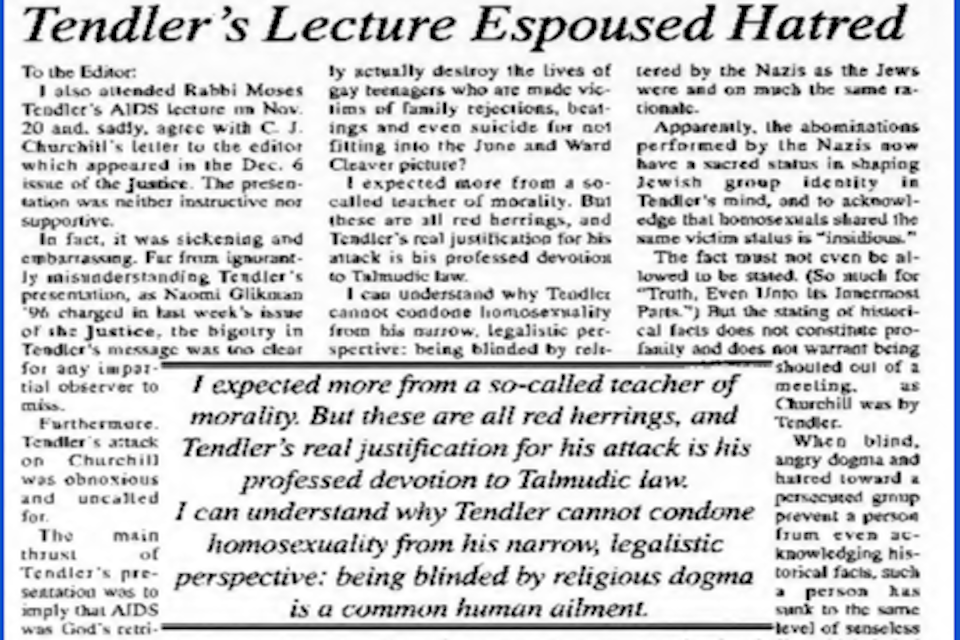
Photo Credit: Courtesy of the Robert D. Farber University Archives & Special Collections Department, Brandeis University
November 1994-January 1995
Rabbi Moses Tendler of Yeshiva University was invited to guest lecture, and discussed "Panic and Pathos: Ethical Implications of the AIDS Epidemic and Homosexuality.” The lecture was critiqued as homophobic, which prompted further responses and resulted in a debate that played out in the Justice over the following several weeks.
1995
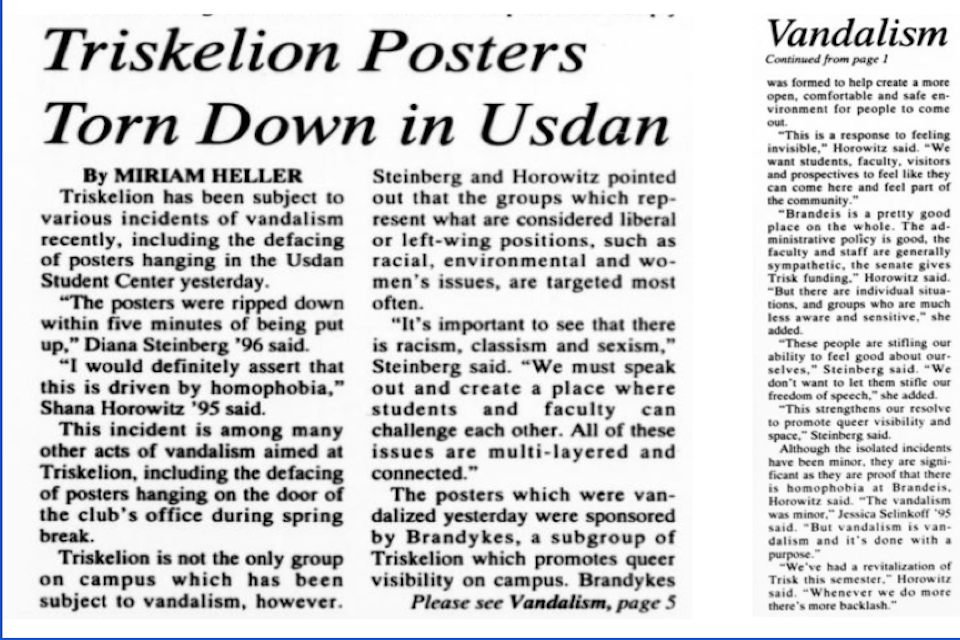
Photo Credit: Courtesy of the Robert D. Farber University Archives & Special Collections Department, Brandeis University
March 1995
Trisk posters were torn down from public billboards again, and the office door suffered vandalism. The nature of the vandalism has been lost, but the most likely candidate is homophobic graffiti. Published incidents of vandalism: 3.
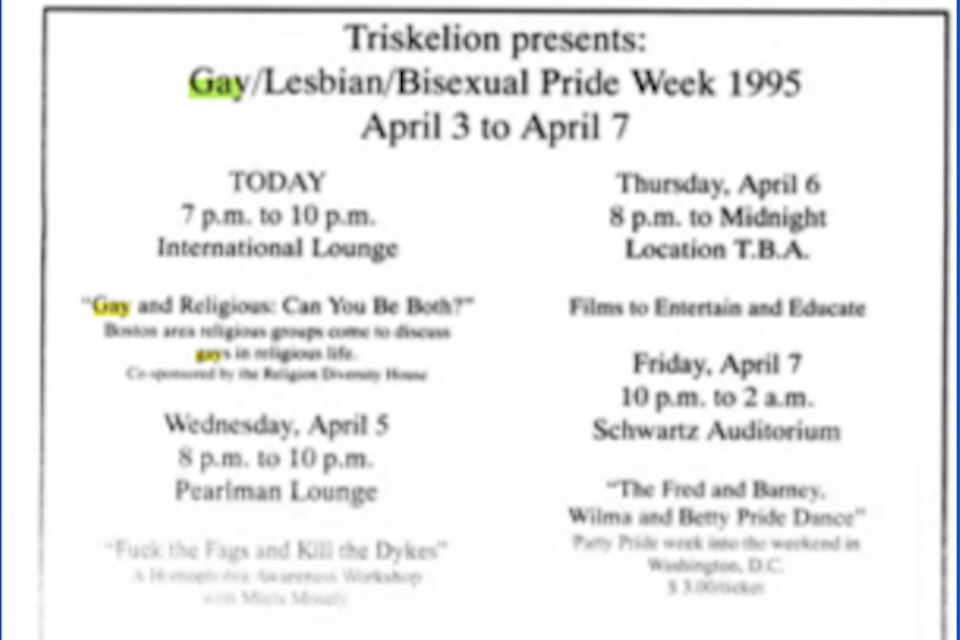
Photo Credit: Courtesy of the Robert D. Farber University Archives & Special Collections Department, Brandeis University
April 3-April 7, 1995
Events feature a program on GLBT youth, a Queer Lunch, a religious panel discussion on homosexuality, a coffeehouse at Cholmondley's, a coming out discussion and/or movie night, and Triscotillion, Trisk's spring dance.
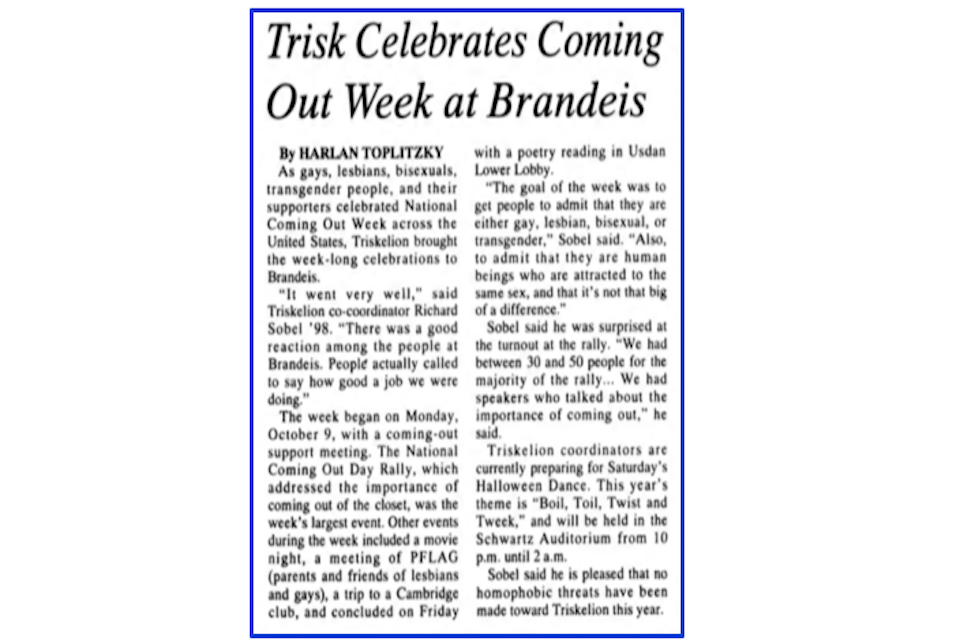
Photo Credit: Courtesy of the Robert D. Farber University Archives & Special Collections Department, Brandeis University
Octoboer 9-October 13, 1995
This was a major expansion of Trisk's earlier 'Coming Out Day' events. Trisk sponsored multiple events, including a "coming out support meeting," a National Coming Out Day Rally, a meeting of PFLAG, a trip to a Cambridge club, and a poetry reading in Usdan Lower Lobby.
1996
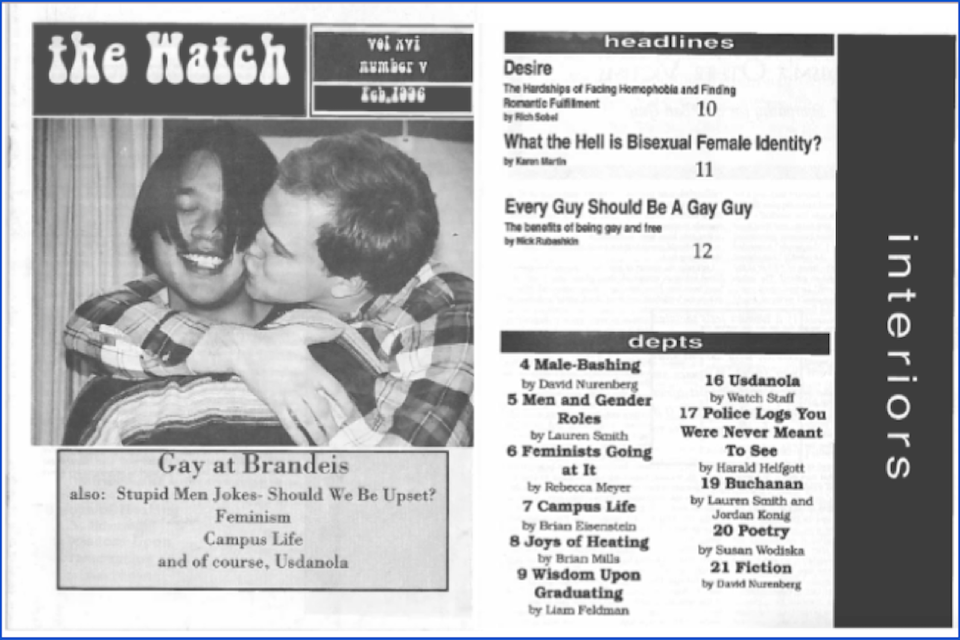
Photo Credit: Courtesy of the Robert D. Farber University Archives & Special Collections Department, Brandeis University
February 1996
This issue of the school's magazine featured a gay couple kissing on the cover, a breakdown of Triskelion, and various articles on queer identity and community. The article was controversial and there were incidents with hundreds of copies disappearing.
1998
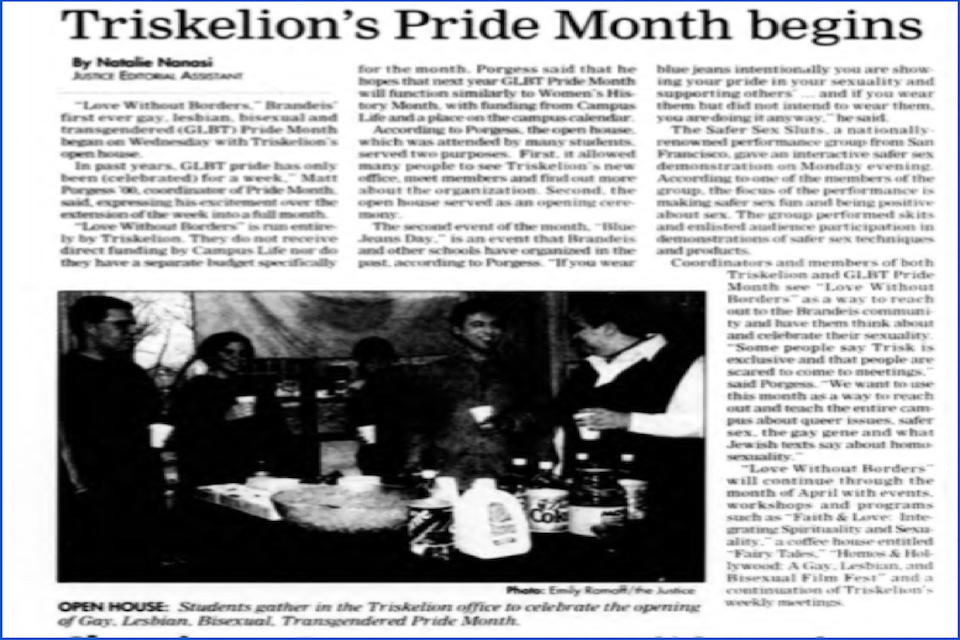
Photo Credit: Courtesy of the Robert D. Farber University Archives & Special Collections Department, Brandeis University
April 1998
The month's theme was "Love Without Borders" and began with an open house hosted by Triskelion. Other events run by Trisk included Blue Jeans day and the "Fairy Tales coffeehouse."
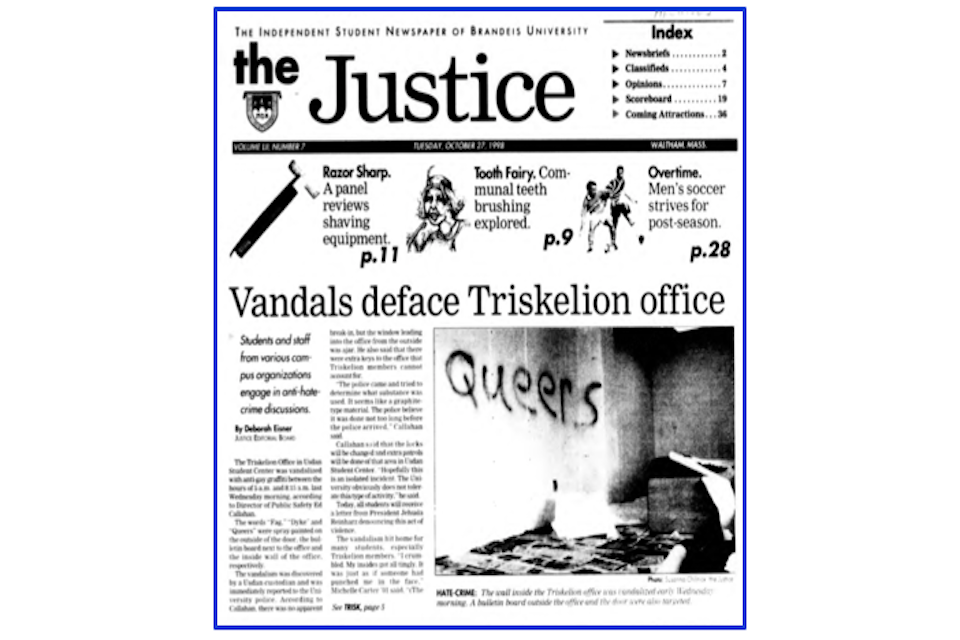
Photo Credit: Courtesy of the Robert D. Farber University Archives & Special Collections Department, Brandeis University
October 21, 1998
Very early on October 21, someone spray-paints slurs onto the walls of Triskelion's office. Published incidents of vandalism: 4
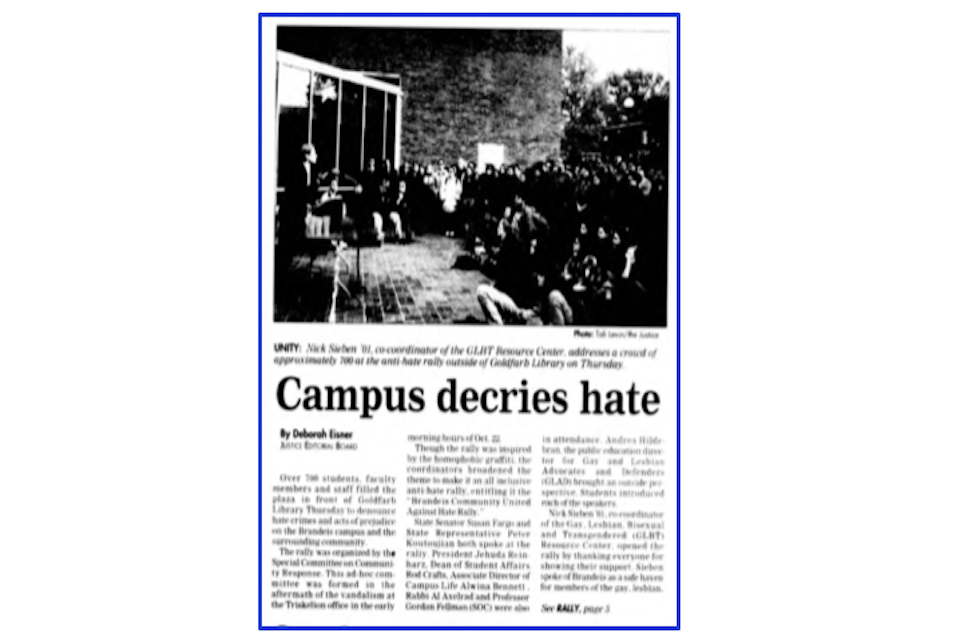
Photo Credit: Courtesy of the Robert D. Farber University Archives & Special Collections Department, Brandeis University
October 29, 1998
On October 27, The Justice publishes an outpouring of support, including letters submitted by students. On October 29, over 700 students, faculty, and staff attend a rally to denounce hate crimes, violence, and prejudice.
November 1998
Eggs are thrown at the exterior windows of the office over the first weekend in November. Published incidents of vandalism: 5
2001
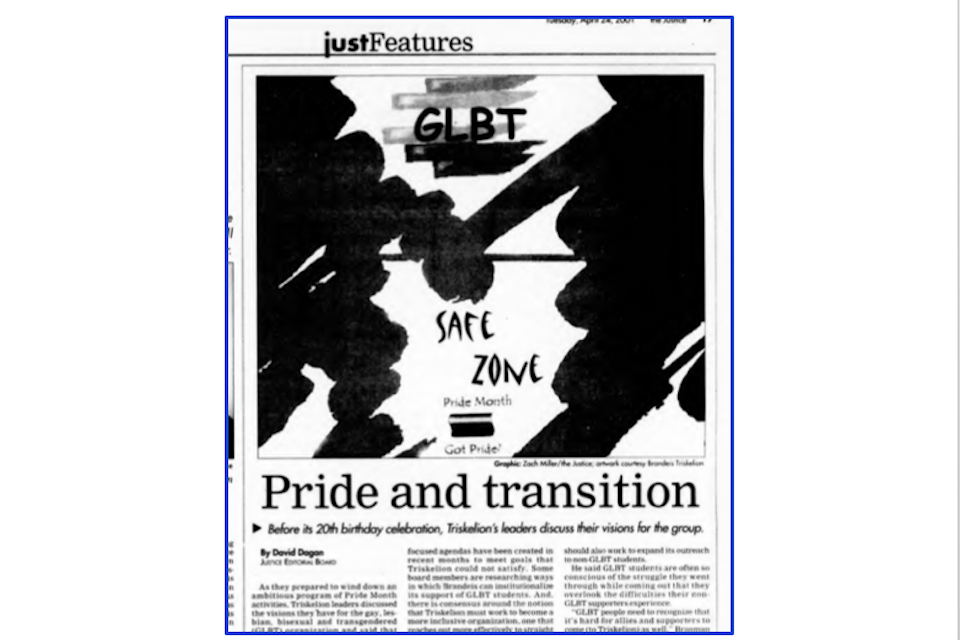
Photo Credit: Courtesy of the Robert D. Farber University Archives & Special Collections Department, Brandeis University
April 2001
Triskelion celebrates its 20th birthday with a series of events and workshops for Pride Week.
2002
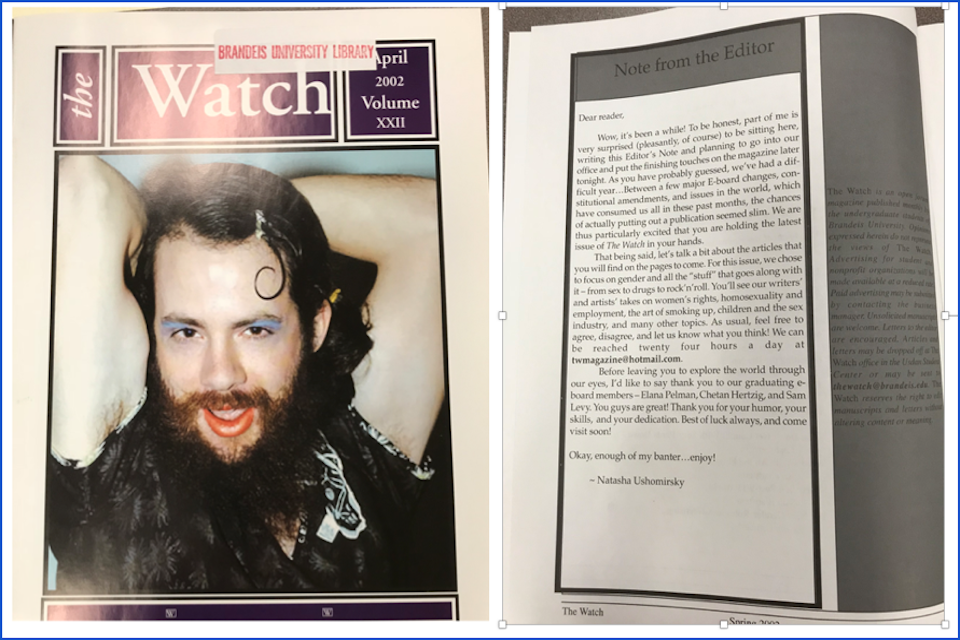
Photo Credit: Courtesy of the Robert D. Farber University Archives & Special Collections Department, Brandeis University
April 2002
The issue covered androgyny, homosexuality and employment discrimination, and other relevant bits.
2003
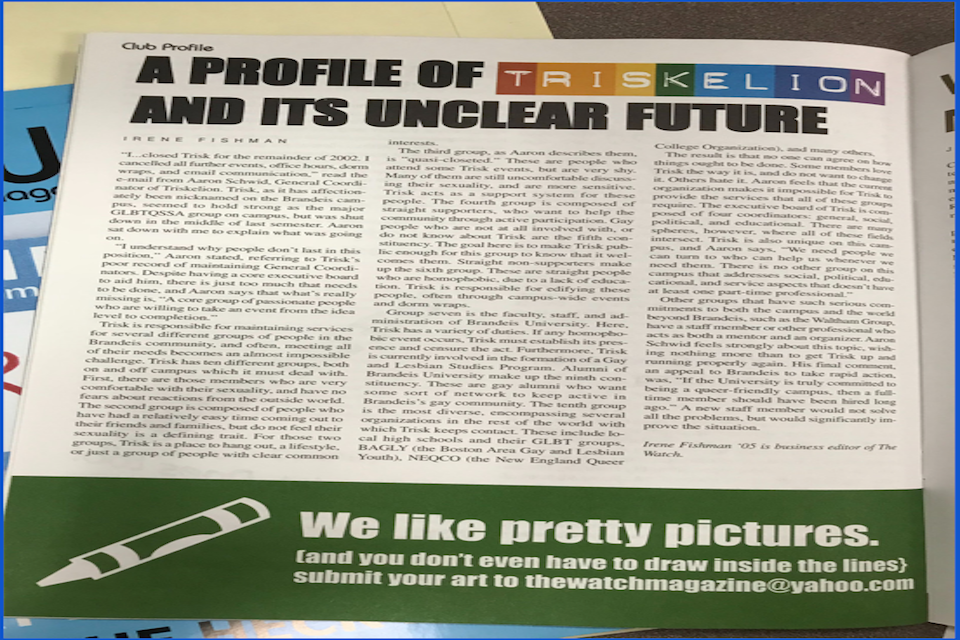
Photo Credit: Courtesy of the Robert D. Farber University Archives & Special Collections Department, Brandeis University
February-April 2003
Triskelion states it wants to restructure and reevaluate its purpose on campus. The group 'reopens' in April for Pride Week and makes the first calls for a Queer Resource Center. The Justice staff publishes a joint editorial calling for a paid non-student advisor for Trisk.
Formerly the Lesbian, Gay, Bisexual, and Transgender Resource Center.
2004
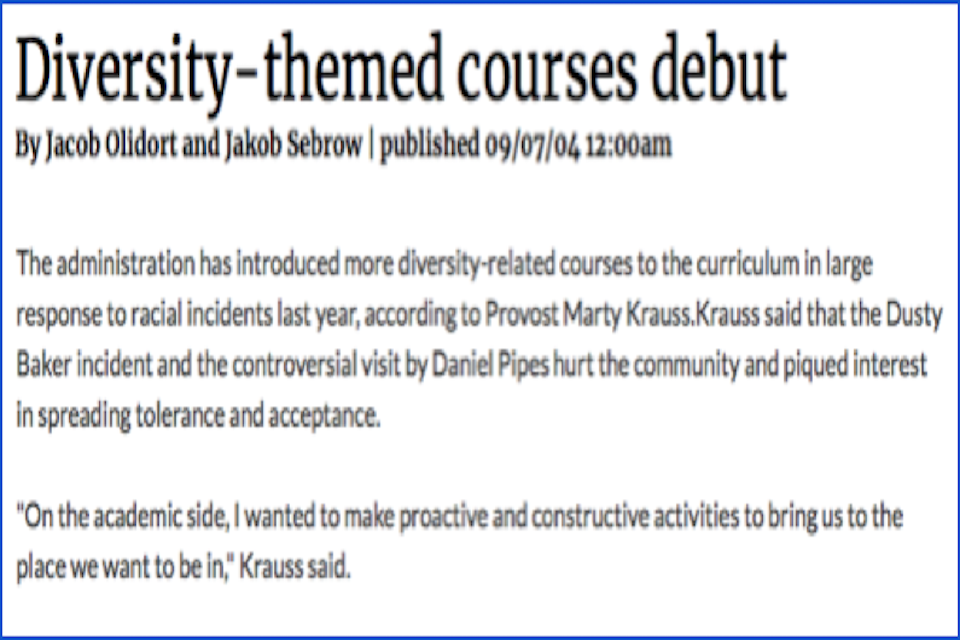
Photo Credit: Courtesy of the Robert D. Farber University Archives & Special Collections Department, Brandeis University
September-December 2004
Other categories introduced were "Religion, Race" and "Culture and Global Perspectives." One specific course was "Queer Readings: Before Stonewall."
2006
October 2006
Mass Resistance--a statewide organization pushing legislation to remove the four Justices who voted in favor of same-sex marriage--brought a speaker to campus. Triskelion collaborated with the Feminist Majority Leadership Alliance and the Radical Student Alliance to stand outside with signs and stage a silent walkout, leaving behind empty seats.
See Images on Mass Resistance Website2010
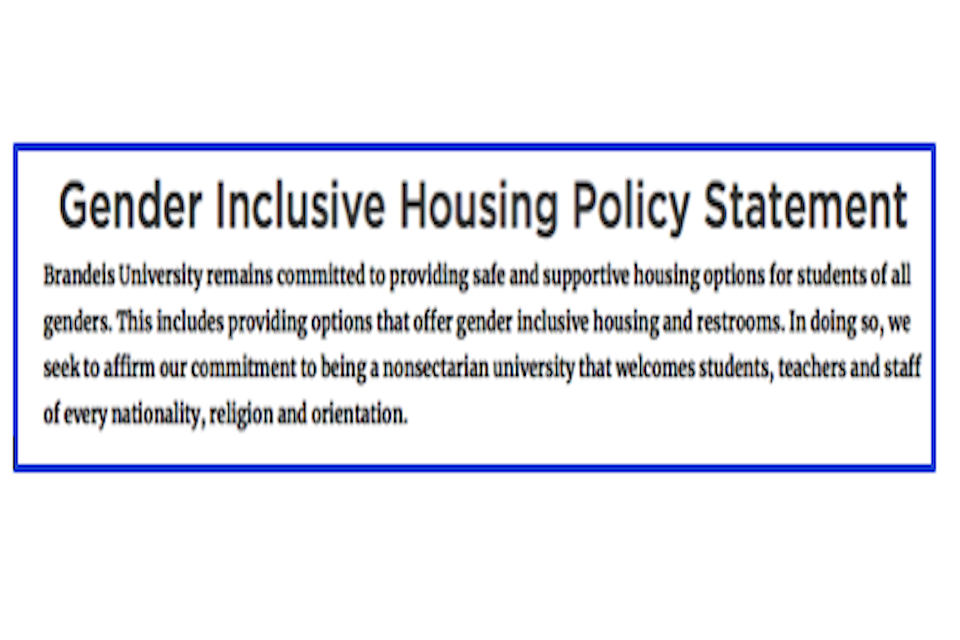
Photo Credit: Courtesy of the Robert D. Farber University Archives & Special Collections Department, Brandeis University
September 2010
The Department of Residence Living had intended to start offering gender-neutral housing in 2008, but it was delayed until this year. Gender-neutral suites already existed, so this primarily affected corridor-style dorms.
2011
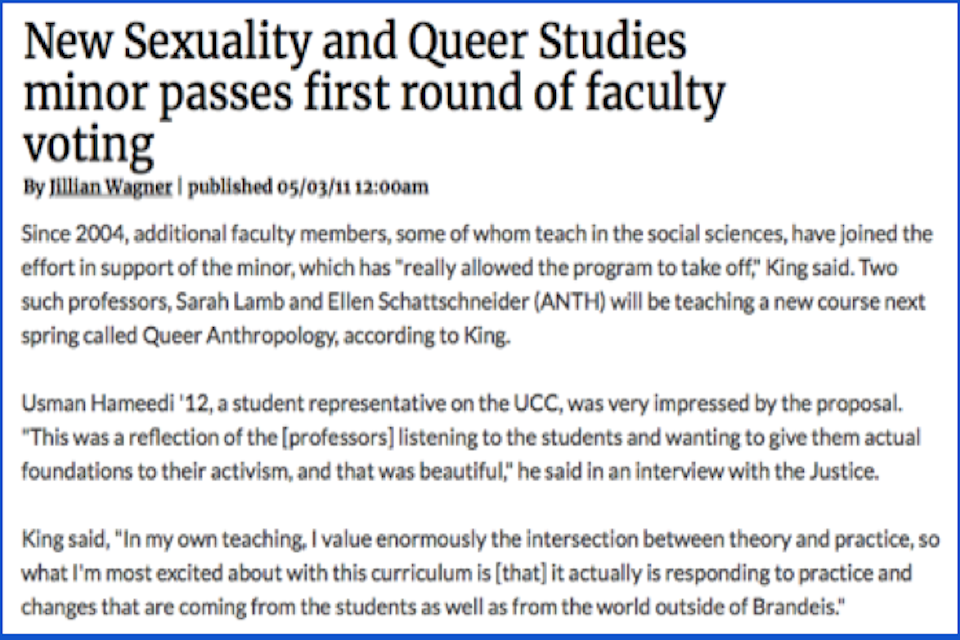
Photo Credit: Courtesy of the Robert D. Farber University Archives & Special Collections Department, Brandeis University
May 2011
This minor proposal had been under discussion since the 2002-2003 academic year, and unanimously passed its first faculty vote in May.
2014
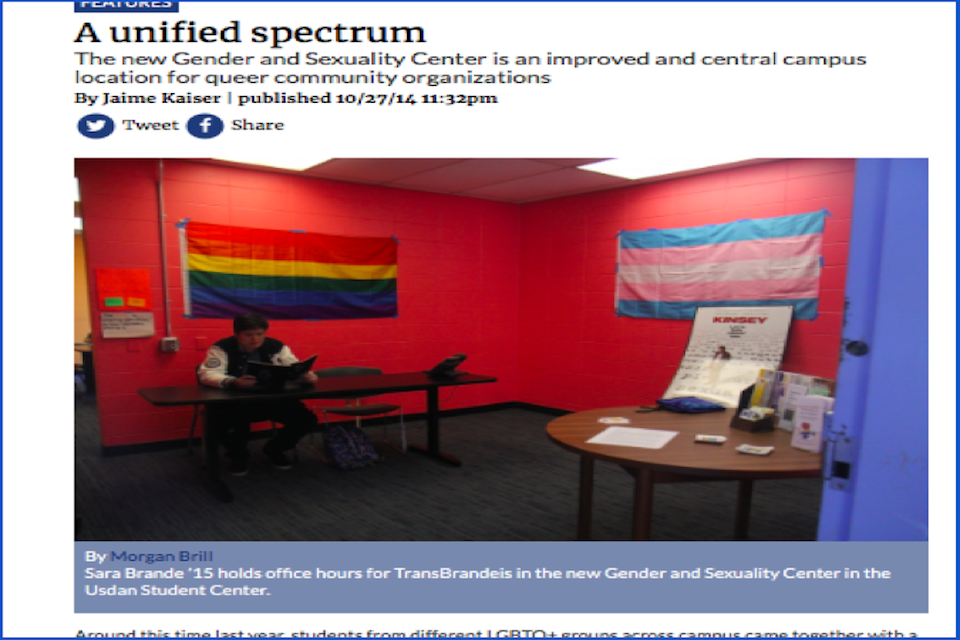
Photo Credit: Courtesy of the Robert D. Farber University Archives & Special Collections Department, Brandeis University
October 20, 2014
The center serves as a home base for various queer groups on campus, hosts the Queer Resource Center, and seeks to provide "resources, positive visibility, an affirming space, and advocacy" for target students. A full time coordinator has yet to be hired.
2018
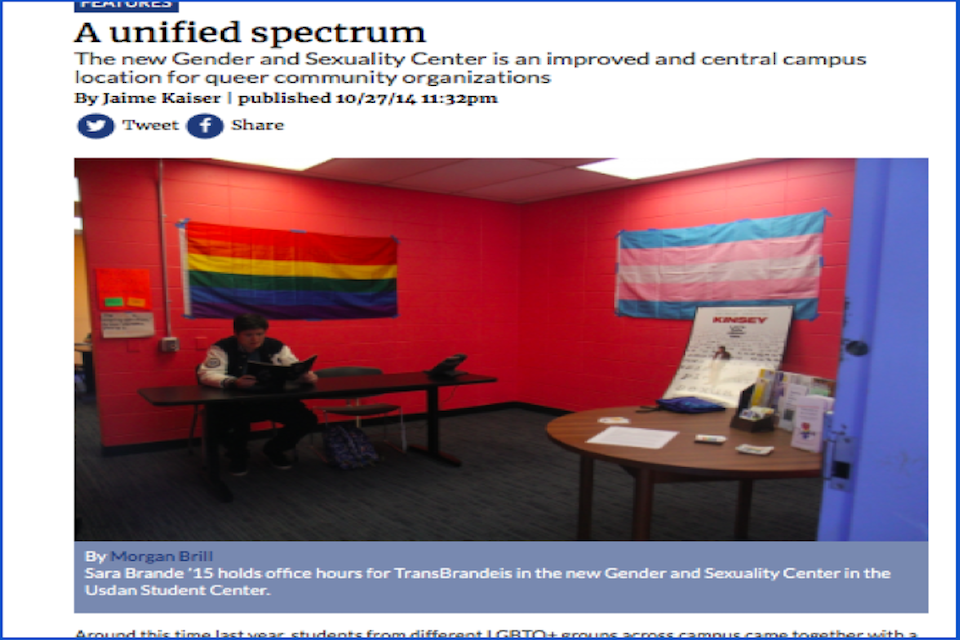
Photo Credit: Courtesy of the Justice
October 16, 2018
The GSC remains an active and living resource for members of the Brandeis queer community.